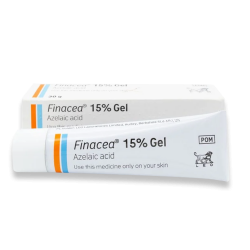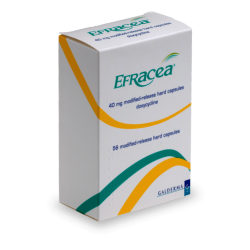All treatments
- Review by a qualified doctor
- Including prescription
- Next-day delivery included
About
Rosacea is a skin condition that is said to affect 1 in 10 people in the UK.
The rash associated with the condition causes the skin on the face to redden and makes the blood vessels around the cheeks, nose, chin and forehead more visible. It can also cause small, pus-filled bumps to form on the face, so it is sometimes incorrectly diagnosed as acne, an allergic reaction or another skin condition.
Rosacea primarily affects the face and is not contagious. However, ocular rosacea can affect the eyes. Rosacea is a relapsing but chronic condition, meaning that symptoms will become more severe for weeks or months at a time, then ease off for short periods.
Despite it being a common condition, rosacea is not well understood by medical professionals or the public. Currently, there is no cure for this condition. However, the symptoms can usually be controlled through a combination of lifestyle changes and medication.
Rosacea can occur in anyone but is most common among middle-aged women with fair skin. However, it often presents more severely in men.
The condition causes significant changes in physical appearance, so can impact the mental health and self-image of those affected. It may alter how individuals feel about themselves and how they interact with others. It is common for individuals with the condition to experience feelings of embarrassment, frustration and low self-esteem.
If you have rosacea, it is important to come to terms with the fact that you have a chronic condition. It may be incurable, but it is controllable and that is the aspect to focus on.
You should also take comfort in the fact that you're not alone; millions of people in the UK have the condition and there is plenty of support available.
Causes
The exact cause of rosacea is unknown; however, several contributing factors have been identified.
The first is that the blood vessels in the face of people with this condition are abnormal or are damaged. For example, exposure to the sun can cause blood vessels to become wider and more visible - this results in the redness associated with rosacea.
It may also be caused by a natural reaction to microscopic mites that are found on the face. These mites, known as Demodex folliculorum, occur naturally on the skin and aren't usually harmful. However, if you have too many of them they may cause skin irritation.
Certain bacteria might also contribute to rosacea. Helicobacter pylori is a bacterium that is usually present in the gut. It can raise the amount of gastrin in your system, a digestive hormone, and this can cause your skin to look flushed.
There is also evidence that rosacea has a genetic component; it is very likely that someone with the condition has a close relative with it too.
Some environmental factors have been identified as 'triggers' for the condition. They are not direct causes, but often exacerbate symptoms by increasing blood flow to the skin's surface.
The most common triggers you should be aware of are:
- sunlight exposure
- extremes in weather (hot or cold)
- strenuous exercise
- stress
- emotional changes
- hot drinks
- alcohol and caffeine
- spicy food
- certain cosmetics
Some drugs that dilate blood vessels might also cause rosacea, including some blood pressure medications.
You are much more likely to develop rosacea if you are a woman with fair skin that is sun-damaged. Smoking, a family history of the condition and being over the age of 30 are also risk factors.
Symptoms
Rosacea often begins with episodes of flushing and blushing. The skin goes red for short amounts of time, but then fades quite quickly. Many experience a burning or stinging sensation in the face, especially in inflamed areas.
As the condition progresses, you may experience some if not all the following symptoms.
- Permanent redness in the forehead, nose, cheeks and chin. However, in some cases it can appear on the head, ears, neck or chest.
- You may also experience spots (either papules or pustules) appearing in the affected area(s). The skin surrounding them can feel hot and tender.
- Another key symptom of rosacea is that the small blood vessels in the skin become visible. This is because broken blood vessels can thicken and swell up in order to heal. In addition to experiencing this on your face, it may occur on your eyelids.
- You may also experience patches of rough, dry skin and notice that your pores appear larger than usual.
- If you have a severe case of rosacea, your face may swell. This is known as lymphoedema and usually affects the area around the eyes.
- In very rare cases, the nose of individuals with rosacea can thicken and appear bulbous and enlarged. This is known as rhinophyma and occurs more often in men with rosacea than in women with the condition.
Rosacea can also affect the eyes as part of a condition called ocular rosacea. This type of rosacea has very specific symptoms which you should be aware of because, if left untreated, it could damage your sight.
People with ocular rosacea report feeling like there is something in their eyes. The eyes are usually dry, irritated and bloodshot, and sometimes the eyelids become inflamed.
Treatment
There is currently no cure for rosacea, but long-term treatment can help control the symptoms.
In some cases, you may be able to temporarily stop treatment when your symptoms have improved, however, it is advised to continue treatment on a daily basis.
For most people, treatment involves a combination of self-help measures and medication. There are several lifestyles changes you can try, including:
- avoiding known triggers and trying to identify some of your own
- protecting your face by applying sunscreen, wearing appropriate clothing (hats, scarves, etc.) and avoiding the midday sun
- treating your skin gently; trying to avoid touching it too often and using a non-soap cleanser and moisturiser regularly. You should also avoid using products that contain alcohol or skin irritants
- wearing make-up (that does not irritate your skin) to reduce the appearance of redness. This should help your self-confidence
- massaging your face once a day to reduce swelling and inflammation. Start on the central part of the face and move your fingers in a circular motion towards the ears
The most common forms of medication used for treating rosacea are topical creams and gels. These are applied directly to the skin to reduce spots and redness.
Brimonidine is the active ingredient in most of these and it constricts the blood vessels for a short amount of time. You can usually see results within 12 hours of application. However, the effect is temporary, so you must apply the treatment regularly to maintain any improvement.
Other gels and creams used to reduce the redness and pimples associated with rosacea include azelaic acid and metronidazole. They can also kill the bacteria on the skin that might be causing the condition. A course of treatment can take 3-6 weeks to see an effect. Finacea, is a medication sold by 121doc that contains azelaic acid - learn more on the product’s dedicated page.
A variety of oral medications can be used to clear up more severe rosacea spots. These tablets and capsules, some of which are antibiotics, decrease the number of bacteria in the body and reduce inflammation. 121doc currently offers Efracea, an effective prescription medication that contains doxycycline.
If your case of rosacea is severe and does not respond to other therapies, your doctor might prescribe you isotretinoin. This is a powerful oral acne drug that helps remove traces of rosacea. You must not use this drug during pregnancy, however, as it can cause serious birth defects.
If you think you have persistent symptoms of rosacea, you should visit your doctor. Early diagnosis and treatment can stop the condition from worsening.
The doctor or dermatologist will then prescribe a course of treatment. This could include the prescription-strength medications mentioned earlier. Alternatively, it could involve laser or intense pulsed light treatment, where beams of light are directed at the visible blood vessels causing them to shrink.
Your doctor or dermatologist may also suggest trying dermabrasion or electrosurgery for more severe cases.
If rosacea is affecting your eyes, you might be referred to an eye specialist.
FAQs
Our consultations include general questions about your health (e.g. blood pressure levels, current and past conditions), as well as specific questions related to your selected treatment. We will also request relevant personal information to complete payment and delivery.
All questions are necessary, and your answers and details will not be shared with any third-parties. Only our doctors have access to your medical information.



